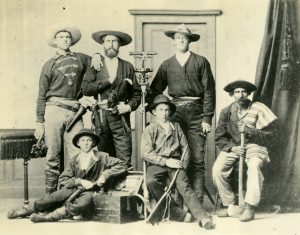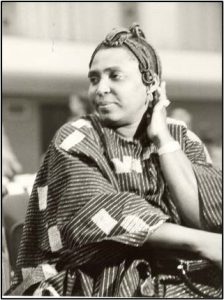Recently, Time Magazine published a listicle of the 100 Best Fantasy Books of All Time. Admittedly, I have not read all 100, I would estimate I’ve read maybe a quarter. I also am not sure that I agree with some that I’ve read that are listed, but I’m not a famous author so they didn’t ask me my opinion. (The panelists included Tomi Adeyemi, Diana Gabaldon, Neil Gaiman, Marlon James, and George R. R. Martin, to name a few).
The oldest book listed was written in the 9th century. Below, I’ve listed the books that are on this list that are also in our Popular Reading Collection. There aren’t too many, but our Popular Reading Collection aims to have books that are recently published, within the past few years. Some notable exceptions are some books by Gaiman and Martin.
Do you have a favorite fantasy book that was published within the last couple of years that’s not on the list? You can always suggest an item to add to the collection!
Adeyemi, Tomi. Children of Blood and Bone
“This West African-inspired epic kicks off a series that uses fantasy to dissect systemic racism and oppression. In it, Zélie Adebola is on a mission to bring the magic back to the kingdom of Orïsha, where years ago the maji people were wiped out by the power-hungry monarchy.” – Time
Adeyemi, Tomi. Children of Virtue and Vengeance
“The second installment of Adeyemi’s YA trilogy finds its fierce protagonist Zélie facing unexpected consequences from restoring the magic to her kingdom. It’s a narrative that interrogates the cyclical nature of oppression and the systems that enforce it. As Orïsha begins to self-destruct in a civil war between the maji and the monarchy, Zélie must fight to save it.” – Time
Emezi, Akwaeke. Pet
“Monsters have been eradicated from the city of Lucille – at least, that’s what everyone is told. But when a creature springs forth from a painting to befriend a trans girl named Jam, the city’s illusions of stability begin to crumble. Emezi has said their YA book is an allegory for the way the U.S. turns a blind eye to its problems, specifically, the high rates of murders of Black trans women.” – Time
Gaiman, Neil. American Gods
“Odin (the Norse god of war, or Mr. Wednesday, as he’s called here) hires Shadow, a recently released convict, to drive him across the U.S. Throughout their travels, he rallies fellow deities from ancient mythologies – including manifestations of Anansi, Anubis and Loki – to his cause: a battle for America’s soul against the rising gods of technology, media and the stock market.” – Time
Gaiman, Neil. Neverwhere
“After stopping to help an injured girl on the sidewalk, London businessman Richard Mayhew is ripped from his perfectly average life: he is suddenly unrecognizable to everyone he knows. Richard must track down the girl in London Below, the menacing and magical city that exists underneath his own. His quest shines a light on the plight of those who fall through the cracks of society.” – Time
Jemisin, N. K. The Fifth Season
“The first entry in Jemisin’s Broken Earth trilogy takes place in the Stillness, a counterintuitively named continent beset by cataclysm. There, apocalypses are so regular and so devastating that they more than earn their place on the calendar. Magic users known as orogenes can quell the Stillness’s deadly quakes, but that talent is rare, and those who have it are under constant threat of violence.” – Time
James, Marlon. Black Leopard, Red Wolf
“The fantasy genre has long been saturated with the myths of Europe. James’ novel offers a stunning corrective, drawing instead on African mythology and history for its character types and narrative renderings in the story of a missing boy and the fantastical crew sent to retrieve him.” – Time
Jemisin, N. K. The Stone Sky
“The final installment of the Broken Earth series made Jemisin the first writer ever to win three consecutive Hugo Awards for Best Novel. The story digs deeper into the foundations of the trilogy’s catastrophe-stricken landscape, while its characters grapple with the question of whether it is just to prevent worlds built on structural oppression from toppling.” – Time
Martin, George R. R. A Storm of Swords
“The third installment in Martin’s A Song of Ice and Fire series is unflinchingly brutal: the so-called Red Wedding and the Purple Wedding and the points, unfold here. The breadth of Martin’s vision comes fully into focus, and if the first book set the precedent for killing off beloved characters, then A Storm of Swords makes clear no one is safe. These are the scenes that became showstopping centerpieces in HBO’s Game of Thrones series and continue to set the high-water mark for shocking plot twists.” – Time
Miller, Madeline. Circe
“In her second novel, Miller offers a fresh take on the sorceress known for turning men into pigs in Homer’s Odyssey and lends multitudes to Circe, something rarely afforded to women in Greek mythology. Over the course of thousands of years, Circe evolves from a young naif into a formidable yet compassionate goddess of magic who must choose once and for all: the immortal life she was born into, or humanity.” – Time
Winter, Evan. The Rage of Dragons
“Touted as a cross between Gladiator and Game of Thrones, Winter’s debut is set among the Omehi people, to whom every so often a woman is born with “the Gift” to control dragons and their detective power. The book’s main character is Tau, a swordsman from an oppressed class who is out for retribution after a terrible tragedy.” – Time


